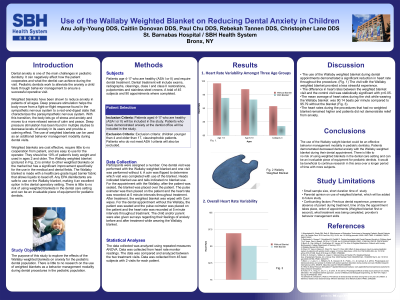Patient Management
10 - Use of the Wallaby Weighted Blanket to Reduce Dental Anxiety


Anu V. Jolly-Young, DDS (she/her/hers)
Pediatric Dental Resident
St. Barnabas Hospital
St. Barnabas Hospital
Forest Hills, New York, United States- PC
Paul Chu, DDS
Program Director
St. Barnabas Hospital
Bronx, New York, United States
Presenting Author(s)
Program Director(s)
Purpose: This prospective cohort study aimed to determine whether the use of the Wallaby weighted blanket could reduce dental anxiety in the pediatric dental population and improve behavior and compliance during treatment. If successful, this can provide dentists with another behavior management modality to improve the patient experience and treatment outcomes.
Methods: The proposed study was performed on 45 children ages 4-17 who are healthy and required dental treatment. Treatment included exams, radiographs, cleanings, class I and II restorations, pulpotomies, stainless steel crowns and extractions. Patients were their own control. One visit was completed with the weighted blanket and one visit without the blanket. The child or parent completed surveys before and after treatment. Their heart rate was monitored and recorded at 5-minute intervals throughout treatment.
Results: Based on the results of this study, there is a statistically significant difference between the average heart rate of patients with the blanket and those without a blanket. Specifically, the heart rate tends to be higher in patients undergoing treatment without a blanket.
Conclusion: Weighted blankets are an effective behavior management modality. Patients demonstrated a positive dental visit with the weighted blanket and had decreased levels of anxiety. Weighted blankets are cost effective, require little to no cooperation from patient, and are easy to use for the operator. There is little to no risk of using weighted blankets in the dental care setting and can be an invaluable piece of equipment for pediatric dentists.
Identify Supporting Agency and Grant Number: The supporting agency is St. Barnabas Hospital.

.jpg)